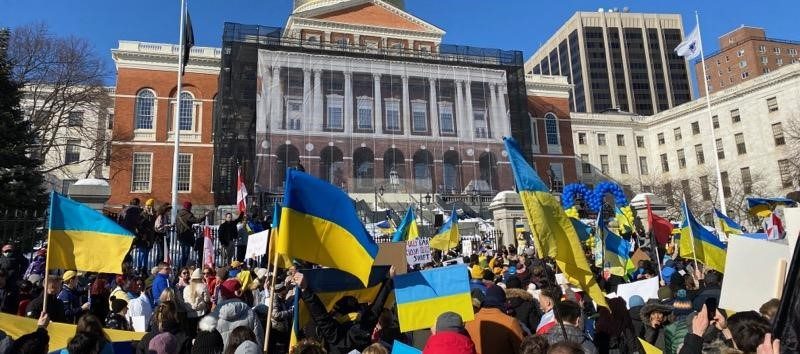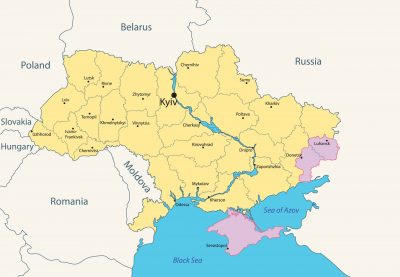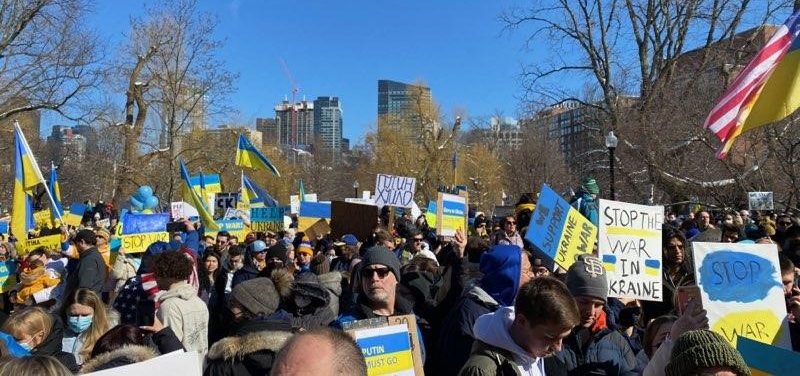Reaction: Crisis in Ukraine
 Boston peace march in support of Ukraine. Credit Anna Belkina
Boston peace march in support of Ukraine. Credit Anna Belkina
BUSM Community Members Share Perspectives
The news that Russian tanks, troops and aircraft had crossed into Ukraine last Thursday did not surprise those in the School of Medicine with ties to one or both countries. It did provoke anger about what they saw as a senseless war as well as concern for the family and colleagues they knew on both sides of the border.
“I always thought he (Russian President Vladimir Putin) was an SOB right from the beginning,” said Konstantin Kandror, PhD, a BUSM professor of biochemistry and medicine. “It (the invasion) surprised me only because it seems like a suicidal move on his part.”
Kandror left the then-Soviet Union in 1991 when he received a working visa from Harvard Medical School as a visiting lecturer. He has been here ever since and is now a U.S. citizen. Kandror said he no longer has family in Russia, but he has many friends there.
“Everyone is so depressed. It’s difficult times for those who don’t support Putin,” he said. “It makes me sick to even try to analyze his thinking.”
Kandror urged some measure of caution in dealing with Putin.
“I think that the West should leave Putin a way out. Indeed, if Hitler had an atomic bomb back in 1945, he was unlikely to commit suicide,” he said.

Maksym “Max” Bartashevskyy, 24, is a first-year medical student who came to the U.S. from Ukraine at the age of 3 with his mother. Growing up he would alternate between New York and Lviv, a city of over 722,000 that is about 50 miles from the Polish border in western Ukraine. Bartashevskyy stayed with his grandparents and socialized with his extended family, attending school in both countries.
“I bounced back and forth until middle school when I was consistently in the U.S.,” he said Friday. He graduated the University of Buffalo and was accepted to BUSM with an expected graduation date of 2025.
Since the invasion began, he’s been monitoring the constant updates pouring in from overseas and talking to his extended family in Lviv. He said his mother is safe in New York.
“It’s relatively calm there (in Lviv); Kyiv is where a lot of the attacks are going on now,” Bartashevskyy said. As of Tuesday, the Russian offensive was largely concentrated on Kyiv, and in Ukraine’s second largest city Kharkiv, as well as the region fanning out from Crimea to the south.
The United Nations estimated that more than 600,000 Ukrainians have now fled to surrounding countries.
 Boston peace march in support of Ukraine. Credit Anna Belkina
Boston peace march in support of Ukraine. Credit Anna Belkina
“I just spoke with my cousin an hour ago. They’re drafting men between 18 and 60. He says that although some families are fleeing, most are not. They want to stay and defend their country. Many are voluntarily going to the armed forces office and signing up to fight,” said Bartashevskyy.
“Civilians are carrying guns in the street and making Molotov cocktails,” he said.
“People are ready to defend themselves. Some have sent their families to Poland, but the men remained to fight,” said Bartashevskyy. “America is my home now, but Ukraine is my homeland. It’s frustrating to be sitting here. I haven’t been able to study since the invasion started. I wish I was over there fighting with them or providing medical aid in whatever way I can.
“We’re witnessing history in the making. A small democratic nation is successfully defending itself against a huge authoritarian regime with the largest army in Europe,” said Bartashevskyy, who was worried that a frustrated Russian army was including civilian targets.
“The Russian military hasn’t made as much progress as they anticipated and now, they’re bombing residential buildings and killing civilians,” he said. “I hope Russia realizes their invasion is failing and turns their military around before more Russian soldiers are sent home in body bags to their mothers. If Putin thinks he’ll be able to take Kyiv, he’s mistaken; they’ll be getting shot at from every window in the capital.”
Anna Belkina, MD, PhD, an assistant professor of pathology & laboratory medicine and director of the Flow Cytometry Core, left Moscow in 2003 following graduation from medical school to pursue her PhD in the U.S. She still has family and friends there, including her mother, a pediatric surgeon in Moscow.
Belkina has been in contact with colleagues and friends in Ukraine who are overwhelmed with the tasks they need to do. “They are worried that the information about the current situation in Ukraine is not reaching the Western media and public,” she said. But Belkina thought the media started catching up to the news over the weekend.
“No one is buying the Russian propaganda anymore,” she said.
Life is constantly interrupted by air raid sirens and the scramble to get to a bomb shelter.
“Multiple (hospital) units have permanently moved into the basements of the buildings, including obstetrics departments in all major hospitals,” said Belkina.
Belkina was initially surprised that Russians were targeting civilians along with military personnel, but now, she said, she is “beyond furious.”
“There are hundreds of casualties, including the elderly and children They are now bombing apartment complexes with non-selective ‘Grad’ missiles (less accurate, truck-mounted artillery rockets) resulting in dozens of people killed and injured,” said Belkina.
“My colleagues and friends who live there have a closer view of how the medical system (in Ukraine) is struggling, especially in Eastern Ukraine where a lot of the infrastructure has been undermined for years,” said Belkina. COVID-19 has only made that worse, she added.
“Of course, the medical system will explode — it has to support both military and civilian casualties,” she said.
View all posts